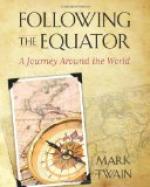Row-boats began to flock from the shore; their crews were the first natives we had seen. These men carried no overplus of clothing, and this was wise, for the weather was hot. Handsome, great dusky men they were, muscular, clean-limbed, and with faces full of character and intelligence. It would be hard to find their superiors anywhere among the dark races, I should think.
Everybody went ashore to look around, and spy out the land, and have that luxury of luxuries to sea-voyagers—a land-dinner. And there we saw more natives: Wrinkled old women, with their flat mammals flung over their shoulders, or hanging down in front like the cold-weather drip from the molasses-faucet; plump and smily young girls, blithe and content, easy and graceful, a pleasure to look at; young matrons, tall, straight, comely, nobly built, sweeping by with chin up, and a gait incomparable for unconscious stateliness and dignity; majestic young men athletes for build and muscle clothed in a loose arrangement of dazzling white, with bronze breast and bronze legs naked, and the head a cannon-swab of solid hair combed straight out from the skull and dyed a rich brick-red. Only sixty years ago they were sunk in darkness; now they have the bicycle. We strolled about the streets of the white folks’ little town, and around over the hills by paths and roads among European dwellings and gardens and plantations, and past clumps of hibiscus that made a body blink, the great blossoms were so intensely red; and by and by we stopped to ask an elderly English colonist a question or two, and to sympathize with him concerning the torrid weather; but he was surprised, and said:
“This? This is not hot. You ought to be here in the summer time once.”
“We supposed that this was summer; it has the ear-marks of it. You could take it to almost any country and deceive people with it. But if it isn’t summer, what does it lack?”
“It lacks half a year. This is mid-winter.”
I had been suffering from colds for several months, and a sudden change of season, like this, could hardly fail to do me hurt. It brought on another cold. It is odd, these sudden jumps from season to season. A fortnight ago we left America in mid-summer, now it is midwinter; about a week hence we shall arrive in Australia in the spring.




